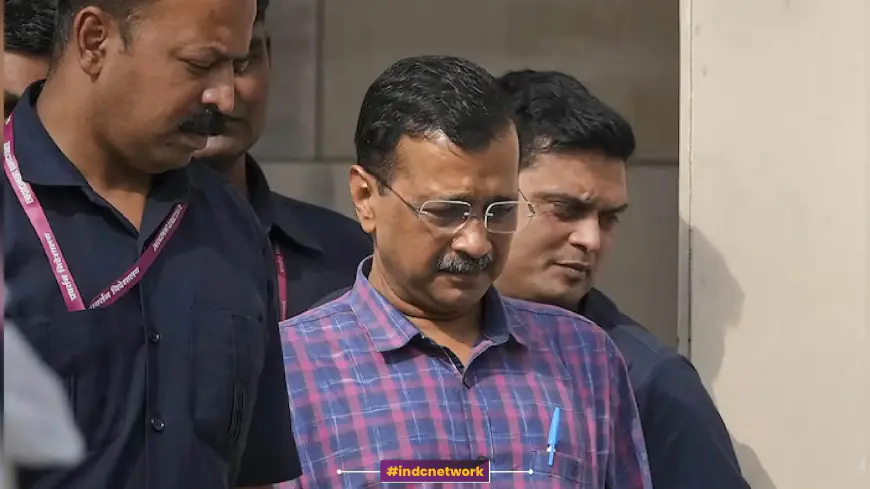Supreme Court Reserves Judgment on Arvind Kejriwal’s Bail Plea in Delhi Excise Policy Case
The Supreme Court has reserved its judgment on Arvind Kejriwal's bail plea in the Delhi excise policy case after hearing arguments from both sides. The Additional Solicitor General, representing the CBI, argued that Kejriwal approached the High Court without going through the trial court, raising legal issues. The ASG also accused Kejriwal of being the "main conspirator" in the excise policy and concealing material information by not attaching the charge sheet to his bail application. The final verdict is expected next Tuesday.

INDC Network : New Delhi : On Thursday, during a hearing in the Supreme Court, the Additional Solicitor General (ASG), representing the CBI, argued that Arvind Kejriwal approached the High Court directly without first going to the Sessions Court. Under Section 439, both courts have concurrent jurisdiction. The preliminary objection raised was that he should have first sought relief from the trial court, which is the appropriate court for assessing the merits of the case.
The ASG noted that other individuals like Manish Sisodia and K. Kavitha approached the trial court, calling this a "snakes and ladders" approach. Justice Bhuyan responded, saying, "The metaphor of 'snakes and ladders' is not a favorable observation for the prosecution." During the hearing, the ASG, representing the CBI, stated that the High Court’s order was well-written and required no interference. Despite a charge sheet being filed, Kejriwal wants the Supreme Court to decide on bail without considering it, raising significant legal issues. The ASG criticized this as an example of “legal audacity.”
Justice Kant remarked that a charge sheet is generally considered a change in circumstances. The ASG replied that in routine procedures, there aren’t multiple hearings and questioned whether the High Court could decide on bail without reviewing the charge sheet, emphasizing that the documents should be considered. The ASG, representing the CBI, argued that in this case, the court had granted permission, and conditions under Section 41 were complied with. He stressed that if there is the power to investigate, there is also the power to arrest in non-cognizable offenses, based on Section 41.
The Supreme Court bench is expected to resume the hearing shortly. The hearing on Arvind Kejriwal’s petition resumed as the Supreme Court reconvened. The ASG, representing the CBI, said, "I was reading our application seeking permission for the arrest." The ASG, representing the CBI, told the Supreme Court bench that "Rs. 44.54 crore were sent from Goa to Delhi through hawala channels, which were used by the Aam Aadmi Party (AAP) in the Goa elections." He cited Dinesh Arora, an approver, who confirmed this.
While reading witnesses' statements in court, the ASG said that Arvind Kejriwal is the "main conspirator" in the Delhi excise policy case. He added, “Kejriwal hastily approved the policy during the peak of the COVID-19 pandemic.” The ASG further said, “Provisions…” He told the Supreme Court, “As per statutory provisions, you must apply for regular bail. Fundamental rights are restricted if it aligns with the court's order. There has been no violation of any constitutional provision or fundamental right. Therefore, a writ challenging the arrest does not hold.” The ASG told the Supreme Court that “even if this court believes Section 41 applies, the arrest was still proper since he falls under the specified categories, and even the court agreed that an arrest could have been made.”
The ASG, representing the CBI, told the Supreme Court, "When we applied for an inquiry under Section 41A, we did not intend to arrest. However, we later found we were entitled to arrest. Even the person served with notice does not have complete immunity from arrest. They can still be arrested for recorded reasons." The ASG added that the case is also listed today in the Delhi High Court and remarked, "Now the problem is that the same petitioner and the same lawyer are in another court at the same time. But I will manage." The ASG then told the Supreme Court, “A charge sheet has been filed against him today. Can he apply for regular bail without attaching the charge sheet? No, he cannot! ... The charge sheet clearly shows his role, and by not attaching the charge sheet, they are withholding information ... They do not want this court to review the charge sheet ... You cannot seek bail while concealing this material ... Without attaching the charge sheet, this bail application must go back ... They have not referred to a single page of the charge sheet. I am making a very serious point! This is not an issue to be overlooked.”
The ASG told the Supreme Court, “I have been informed that the court has taken cognizance of the charge sheet. This means a prima facie case is made ... Today, if the honorable judge grants bail, it will demoralize the High Court". Kejriwal’s representative, Singhvi, responded, "The CBI is caught up in everything except the CRPC. They argue that when someone is in custody, Section 41A is not required, alternatively applying Section 41A through the court."
The Supreme Court on Thursday reserved its judgment on Arvind Kejriwal's bail plea in the Delhi excise policy case. After hearing the arguments from the lawyers, the bench said, "Thank you for your assistance. The judgment is reserved." The next hearing is scheduled for Tuesday.









